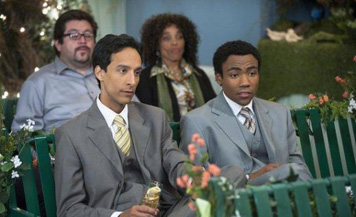|
|
Mythology: CommunityBy Martin FelipeMarch 16, 2012
Community is both sitcom and an examination of sitcoms. It’s like a house of mirrors, reflecting infinitely back upon itself. It’s a very calculated, academic show. And that is its biggest problem in courting a mass audience. We are an ironic culture in 2012, yes. So there is an audience for such a self-reflexive program. But we still have a desire to let go of our pretensions from time to time, and relax with a bunch of great characters that we love. A place where we can go, if you will, where we know everybody’s name, and let go of all of our sneering for 22 minutes. I think this is where some viewers have problems with Community. The characters don’t always seem to be characters so much as they are characters about characters. Pierce isn’t just a curmudgeonly old man; he is also a representation of a curmudgeonly old man. To go back to the Simpson’s example, yes that show mocks both sitcoms and itself, but, in the end, Homer and the family are loving characters whose warmth overpowers the satirical bite. Community’s characters never soften to that degree. Well, that’s not quite true. They do, but it’s in the service of commentary on the softening, rendering it cold again. Really, every time you look at any moment on Community, you see how it’s both a legitimate moment, and a commentary on that type of moment in a sitcom. It’s an endless back and forth of meaning and sentiment. While the Simpsons will put the analysis aside for a genuine, heartfelt moment, the heartfelt moments in Community always serve multiple purposes. As a result, the show can often seem emotionally remote, which of course there’s nothing wrong with. Seinfeld enjoyed quite a bit of success with a similar aesthetic. For whatever reason, however, Seinfeld broke through in a way that Community hasn’t. Again, I think it’s that, despite Seinfeld’s coarseness, it’s still a show with characters, while Community is a show about characters. There is always one intellectual step of removal with Community that I don’t think any other show, no mater how post-modern, has achieved to date. You can never really let go, while watching Community, and the result is that it makes your head swim. Not that there’s anything wrong with that. Community is a sitcom about college, and is practically a college course on the sitcom itself. I do believe that the buzz on the show has reached such a fever pitch that we’re very likely to see another year for it. And that’s just about right. A four-year show about a four-year college. The structure is such a delicate balance between storytelling and commenting on storytelling that it could prove impossible to sustain for much longer before toppling over into its own self-reflexive black hole. I doubt it’ll ever be a huge hit, but I do believe it will live a long life beyond its run, Arrested Development style. I think there’s something appropriate about that. A show about itself, living on, and on, both attracting and repelling new audiences for decades to come.
|

|
|
|

|
Friday, November 1, 2024
© 2024 Box Office Prophets, a division of One Of Us, Inc.


